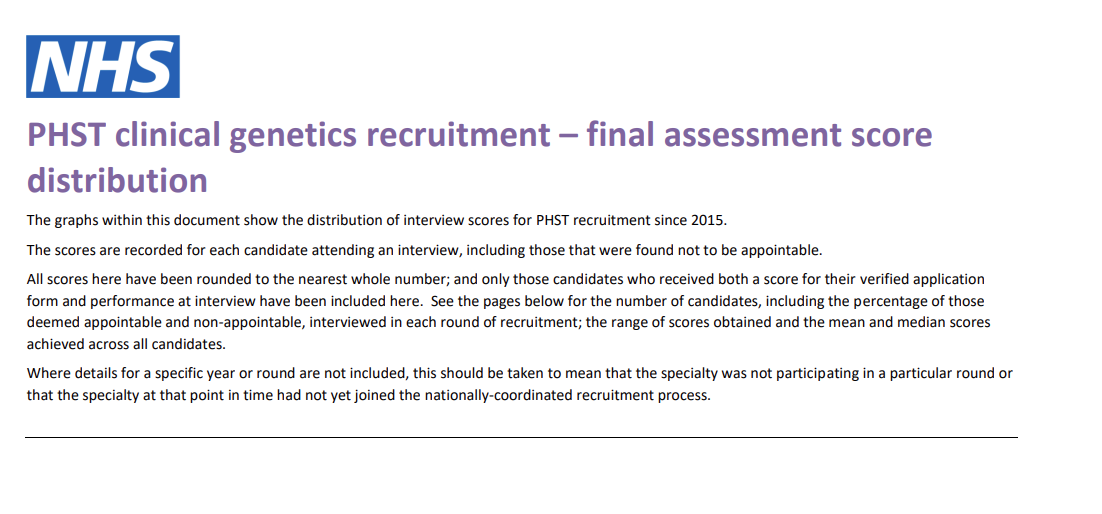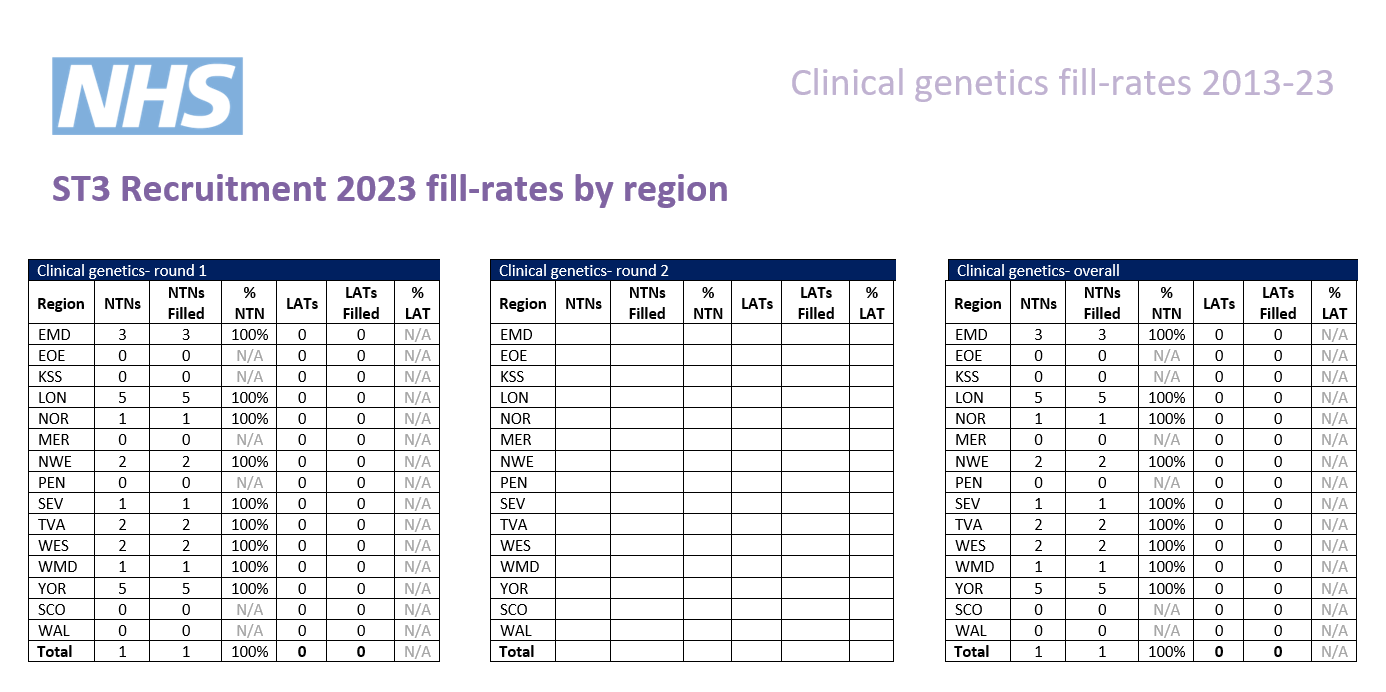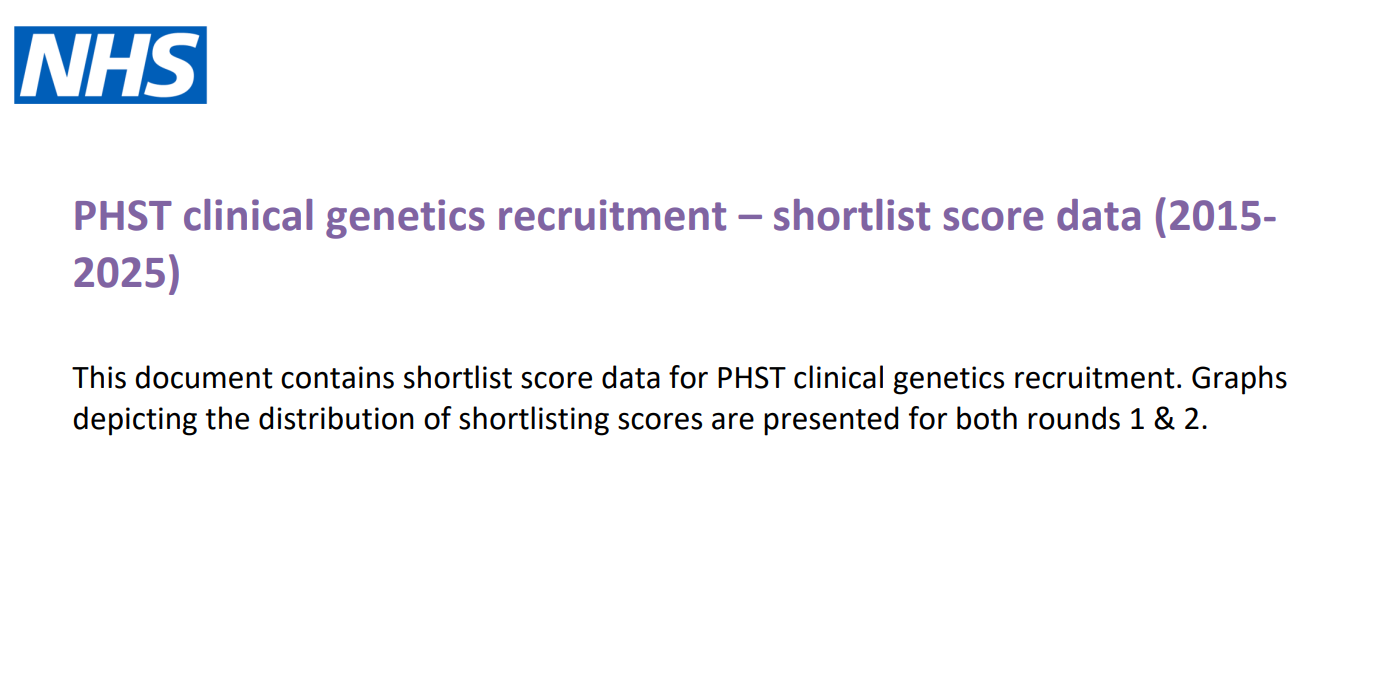Clinical genetics is an exciting and tremendously varied specialty that touches on numerous other medical specialties.
Clinical genetics trainee characteristics
Clinical genetics will particularly suit trainees who are:
-
good communicators
-
those who enjoy variety
-
team workers
-
inquisitive
-
able to work with a measure of independence.
Working in clinical genetics
Clinical genetics is largely outpatient-based, with some ward referrals for specialist opinion. Clinical geneticists generally work in multidisciplinary, Regional Genetic Centres in close collaboration with laboratory scientists, genetic counsellors and academic colleagues.
The key roles of a clinical geneticist are to diagnose inherited disorders and birth defects, estimate genetic risks, organise appropriate genomic or other testing, and to provide advice to individuals who may have, or be at risk of, a genetic disorder. The work includes clinical assessment and working with laboratory scientists to interpret the significance of test results.
Since genetic disorders can affect people of all ages and involve all body systems, clinical geneticists work closely with a wide range of other specialties, frequently in multi-disciplinary clinics. Some sub-specialisation (dysmorphology, cancer genetics, neurogenetics, cardiac genetics, etc. ) is therefore common.
Entry into the specialty is usually at the ST3 level, either as a clinical or an academic trainee. Recruitment is arranged annually with candidates competing at a national level. Most trainees have a background in adult or paediatric medicine and must have MRCP(UK), MRCPCH or equivalent (please see ST3 clinical genetics person specifiction) prior to entry at ST3.
Most trainees become NHS consultants but those with a research interest may become full or part-time academic consultants, with fewer clinical commitments. Teaching is also an important part of the workload of most clinical geneticists.
Specialty trainees in Clinical Genetics will usually be based at a single regional genetics centre for the duration of their training although trainees may be expected to spend time in other units. Regional genetics centres provide clinical services for large geographical areas and often provide outreach clinics at other hospitals. Specialty trainees will participate in these clinics and regular travel may be necessary as part of training.
Further information
General / application queries
For general queries relating to areas such as eligibility criteria, making an application or the Oriel system, please contact the Physician Specialty Recruitment Office.
Queries regarding the progress of a submitted application should be directed to the lead recruiter for this specialty. The lead recruiter for clinical genetics is the Midlands.
| Midlands | ||||||
|---|---|---|---|---|---|---|
| Enquiries | Support : midlands.freshdesk.com | |||||
Not expected to participate in round 2
This specialty does not normally participate in the second round. Although it cannot be guaranteed until the first round is completed, it is unlikely that there will be a second round for this specialty this recruitment year. Participation in the second round is confirmed in June each year.
Group 2 specialty
This is a Group 2 specialty and requires completion of the first two years of the internal medicine training (IMT) stage 1 programme or equivalent. Please visit the am I eligible? section of this website for further information about the eligibility criteria for Group 2 specialties.
Please be aware that clinical genetics accepts applicants from several other training routes, in addition to core-level physician training: anaesthetics, general practice, obstetrics and gynaecology, opthalmology, paediatrics, psychiatry, surgery.
Non-physician applicants must have obtained the basic specialty professional examination in addition to specific clinical experience and competences to be eligible.
Please view the specialty's person specification for information about the requirements for applying from a non-physician background and the deadlines for when this must be achieved.
Current UK paediatric resident doctors
Person specifications state that completion of the required level of training for those currently in training, must be completed by the advertised post start date; which is early August for Round 1 and early February for Round 2. As all UK paediatric training programmes rotate in September and March, an exception will be made for those currently in ST3 training and due to complete that level within a month of the advertised post start date.
Applicants in this position can answer the application form on the basis of completing training by the advertised post start date, even though this will be up to a month after what is published. No further extensions will be permissible and this is purely to account for the UK-wide standard rotation dates of this specialty.
Commitment to specialty
The specialty will be assessing your commitment to specialty as part of the shortlisting process. Please visit the application scoring page for more information about how this is assessed and scored.
As part of the process of applying to HST, you may wish to gain an idea of how recruitment progressed in previous years for the various specialties participating in the nationally-coordinated recruitment.
To this end, we have published data dating back to 2013 (where this is available), based around four main areas:
-
Competition ratios - application numbers submitted to each specialty, along with the number of NTN and LAT posts available in each. It is worth noting that posts are subject to change throughout the round (increasing on average between 20-40%), and post numbers for this data are taken at the end of the round.
-
Shortlist scores - the scores awarded to all submitted applications, including average scores and distribution nationally.
-
Total scores - the total score awarded to all candidates who completed the full recruitment process for a specialty (application and interview), including some analysis of scores.
-
Post fill rates - the number of posts filled by region.
We have published information for all specialties participating in our process that year; consequently not all specialties will have data in all cases.
Round 1
| Year | Apps. | NTN posts | LAT posts | Total posts | Comp. | Unique* |
|---|---|---|---|---|---|---|
| 2025 | 84 | 15 | 0 | 15 | 5.6 | 56% |
| 2024 | 59 | 15 | 0 | 15 | 3.9 | 56% |
| 2023 | 62 | 23 | 0 | 23 | 2.7 | 76% |
| 2022 | 60 | 12 | 0 | 12 | 5 | 65% |
| 2021 | 56 | 18 | 0 | 18 | 3.1 | N/A** |
| 2020 | 40 | 13 | 0 | 13 | 3.1 | 78% |
| 2019 | 27 | 14 | 0 | 14 | 1.9 | 96% |
| 2018 | 35 | 13 | 0 | 13 | 2.7 | 74% |
| 2017 | 28 | 12 | 0 | 12 | 2.3 | 79% |
| 2016 | 30 | 10 | 0 | 10 | 3.0 | 60% |
| 2015 | 30 | 11 | 5 | 16 | 1.9 | 73% |
* the percentage of unique candidates that only applied to this specialty (out of the PSRO-coordinated specialties)
** As many specialties did not participate in recruitment in 2021, the data is not comparable.
Round 2
| Year | Apps. | NTN posts | LAT posts | Total posts | Comp. |
|---|---|---|---|---|---|
| 2021 |
This specialty has not run in Round 2 since 2016. |
||||
| 2020 | |||||
| 2019 | |||||
| 2018 | |||||
| 2017 | |||||
| 2016 | 14 | 10 | 0 | 10 | 1.4 |
| 2015 | 8 | 2 | 6 | 8 | 1.0 |
Indicative post numbers
Indicative vacancy numbers are available in the table below, broken down by region and divided between substantive national training number (NTN) and locum appointment for training (LAT) posts. In many cases these will be presented as a range (e.g. 1-4) as it is not always possible for regions to know at this stage how many vacancies there will be.
It is the intention that indicative post numbers for all regions will be published prior to the application opening date, although this cannot be guaranteed. Please note that this table is not likely to be updated subsequent to indicative numbers and actual numbers will be confirmed when programme preferences are opened later in the round.
Numbers subject to change
Please be aware that it is not uncommon for vacancy numbers to change as the round progresses.
More commonly, post vacancy numbers can increase as the round goes on (and confirmation of posts becomes available); but it is also possible that numbers can reduce as well. In the past, post numbers have risen an average of 20-40% from the start to the finish of the round but this can vary greatly for individual specialty/region combinations.
It is possible that regions which do not have a post at the start of the round may declare one after applications have closed. Whilst we try and minimise instances of this, it is not always possible to predict vacancies so even if there appears not to be a vacancy in your preferred specialty/region combination, you may wish to consider applying in case one becomes available during the round; you can check with the region concerned if you wish to check on the likelihood of a post arising.
Generally, once a region enter a post into a round they would always have at least one post available and would only withdraw it in exceptional circumstances.
Round 1 interview dates & posts
| Region | NTN posts | LAT posts* | Evidence upload date(s) | Interview date(s) |
|---|---|---|---|---|
| East Midlands | 0 - 1 | N/A |
Week commencing 22 December 2025 |
25 February 2026 |
| East of England | 0 - 1 | N/A | ||
|
London |
2 - 4 |
N/A | ||
|
Kent, Surrey and Sussex |
N/A |
N/A | ||
| North East | 0 - 1 | N/A | ||
|
North West (Joint North West and Mersey programme) |
0 - 1 |
N/A | ||
| South West |
Peninsula 1 - 3 |
N/A | ||
|
Severn |
N/A | |||
| Thames Valley | 0 - 1 | N/A | ||
| Wessex | 0 - 2 | N/A | ||
| West Midlands | 0 - 1 | N/A | ||
| Yorkshire & Humber | 0 - 3 | N/A | ||
| Northern Ireland | 0 - 1 | TBC | ||
| Scotland** | 0 - 2 | TBC | ||
| Wales | 2 - 4 | TBC |
*English LATs
Please note, English regions do not recruit to LAT posts.
**Scotland post numbers
If you are interested in working in Scotland, a breakdown of post numbers by the four Scottish regions is available on the Scottish Medical Training website. This has details of all specialty training post numbers in Scotland, including specialties which are not part of the nationally-coordinated process.
The SMT website will always be the more accurate one where they differ.
Interview content
The interview will be split across two stations with a separate pair of interviewers scoring you on the areas in their station. There will be four questions which range between 5-10 minutes in length. You will be marked on these questions and your communication skills, giving five scored areas in total. The headings below show the question areas and in which station they will be covered, along with information about what will be assessed.
Each station will last 15 minutes, so, including the time between stations, the interview will be approximately 40 minutes.
Please note that this is subject to change and will be confirmed by the date of interview.
Prior to this question you will be given a clinical scenario and a short while to review it. You will then be asked questions relating to this scenario. This question will last approximately 10 minutes.
The clinical scenario will be relatively brief (two/three sentences), so once you have seen this, the remainder of the preparation time will allow you to undertake some short mental preparation. Whilst it is permitted to make notes, these must be destroyed as soon as your interview is completed and not shared with anyone.
Clinical scenario considerations
The scenario will describe a hypothetical clinical situation which has arisen in which you are, or have become, involved. Some points to consider when reviewing the scenario and preparing for discussion are:
- what steps you would take
- any management issues
- any further information you would gather
- how you would go about communicating with any people (eg patients, family members, colleagues) involved in the scenario
You should also consider any other factors you deem appropriate, using your experience and professional judgement.
This question will focus on new technologies and their introduction into the NHS. This question will take approximately 5 minutes.
No specific preparation will be required of you here, and you will not receive information in advance as you did with the clinical scenario.
However, we would advise undertaking some general preparation. For example, familiarising yourself with new developments in the specialty and their impact on future service and the challenges, benefits, costs, etc. of research more broadly.
Not an actual question, you will be assessed and scored specifically on the communication skills you demonstrate throughout the station.
This will be both an assessment of how you would communicate with patients, colleagues, etc. in the scenario, as well as of how well you communicate with interviewers throughout all questions.
This is where your application form and training to date will be reviewed. Interviewers will ask you questions based on your career, achievements to date and your engagement with training and learning.
It is important to recognise that the scores awarded to you will not purely be about your achievements, as this already contributes towards the scoring via your application form. Interviewers will be deciding upon scores via a combination of factors, for example: your responses to the questions asked, the breadth and quality of your achievements and your career progression.
This question will take approximately 8 minutes.
This question will focus on your suitability for and commitment to training in the specialty and give you opportunity to expand on the information provided in your application form.
This question will last approximately 7 minutes.
Scoring framework
The score of 1-5 an interviewer will award you for each assessment area is judged in relation to how well you perform against an expected level. Below is the framework used to award scores at interview, as well as interpretation of what these scores represent:
|
Mark
|
Rating
|
Assessment
|
|
1 |
poor |
not considered appointable |
|
2 |
area for concern |
performed below the level expected from a core level trainee applying to the specialty; |
|
3 |
satisfactory |
performed at the level expected of a core level trainee applying to the specialty; |
|
4 |
good |
above average ability; |
|
5 |
excellent |
highly performing trainee; |
As shown in the table, for each of the question areas at interview, 3/5 is considered a satisfactory score; and reflects the level of performance that would be expected of a trainee ready to progress to a specialty training programme.
Should your performance go above and beyond this expected level, interviewers can award marks of 4/5 or 5/5 as appropriate.
Conversely, should your interview performance not reach the expected level, then interviewers can award marks of 1/5 or 2/5, as reflects their level of concern over your performance.
Appointability
Raw interview score (RIS)
The RIS is the sum of all ten scores awarded to you during your interview, but before any weighting is applied.
As each individual score will be between 1 and 5, your RIS will be between 10 and 50.
Appointability requirements
To be classed as 'appointable', you must meet all three criteria below:
- none of your ten interview scores can be 1/5
- no more than two of your ten interview scores can be 2/5
- your RIS must be 30 or above.
If you meet all three requirements, your application will be assessed as appointable, and can progress to be considered for post offers.
However, if you fail to meet any of these requirements, your application must then be assessed as not appointable, and it will progress no further in that round.
Total score
After interview, a weighting is applied to the scores in each area, as well as your application score.
These scores are then combined to give your total score which determines your ranking, which will in turn be used to inform how offers are made. The weighting of different sections, as well as the method by which your total score is established, is detailed in the table accessible below:
|
|
Interviewer 1
|
Interviewer 2
|
Weighting
|
Max score
|
|
Question 1 |
||||
|
Clinical scenario |
/ 5 |
/ 5 |
2.0 |
20 |
|
Question 2 |
||||
|
Research and service |
/ 5 |
/ 5 |
1.5 |
15 |
|
Question 3 |
||||
|
Communication mark |
/ 5 |
/ 5 |
1.0 |
10 |
|
Question 4 |
||||
| Application and training | / 5 | / 5 | 2.0 | 20 |
| Question 5 | ||||
| Suitability and commitment | / 5 | / 5 | 1.5 | 15 |
|
Raw interview score |
/ 40 |
|||
|
Interview score (w weighting) |
/ 80 |
|||
|
Application score |
/ 40 |
0.5 |
/ 20 |
|
|
Total score |
/ 100 |
|||




